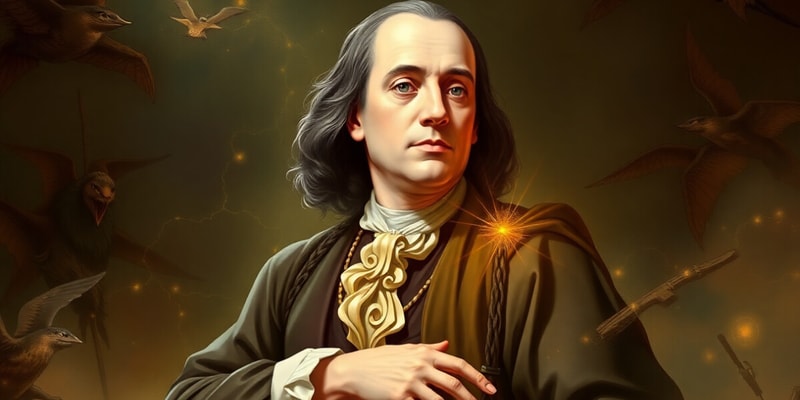Podcast
Questions and Answers
What was the result of the American victory at Saratoga in 1777?
What was the result of the American victory at Saratoga in 1777?
Benjamin Franklin was opposed to the system of checks and balances.
Benjamin Franklin was opposed to the system of checks and balances.
False
In what year did Franklin participate in the Constitutional Convention?
In what year did Franklin participate in the Constitutional Convention?
1787
Franklin invented the __________, which helped protect buildings from lightning.
Franklin invented the __________, which helped protect buildings from lightning.
Signup and view all the answers
Match the following contributions to Franklin's legacy:
Match the following contributions to Franklin's legacy:
Signup and view all the answers
Which of the following best describes Franklin's influence on American institutions?
Which of the following best describes Franklin's influence on American institutions?
Signup and view all the answers
Franklin's views on slavery remained unchanged throughout his life.
Franklin's views on slavery remained unchanged throughout his life.
Signup and view all the answers
What was one of Franklin's inventions that helped protect buildings from lightning?
What was one of Franklin's inventions that helped protect buildings from lightning?
Signup and view all the answers
Benjamin Franklin's family was involved in the trade of bookbinding.
Benjamin Franklin's family was involved in the trade of bookbinding.
Signup and view all the answers
What city did Franklin move to after fleeing Boston?
What city did Franklin move to after fleeing Boston?
Signup and view all the answers
Franklin traveled to ________ to secure support for the American cause after the Declaration of Independence.
Franklin traveled to ________ to secure support for the American cause after the Declaration of Independence.
Signup and view all the answers
Which newspaper did Franklin use to shape public discourse?
Which newspaper did Franklin use to shape public discourse?
Signup and view all the answers
Match the following events with their corresponding years:
Match the following events with their corresponding years:
Signup and view all the answers
Franklin edited the phrase 'We hold these truths to be self-evident...' in the Declaration of Independence.
Franklin edited the phrase 'We hold these truths to be self-evident...' in the Declaration of Independence.
Signup and view all the answers
What did Franklin use as his 'personal university' to seek knowledge?
What did Franklin use as his 'personal university' to seek knowledge?
Signup and view all the answers
Study Notes
### Early Life & Humble Beginnings
- Benjamin Franklin, born in Boston in 1706, was the 10th son of a 10th son.
- His family was involved in the trade of candlemaking.
- Franklin's formal education was limited, ending with his apprenticeship.
- Despite limited education, he possessed a thirst for knowledge and sought it out relentlessly.
- Franklin used print shops as personal universities, bookshelves as treasure troves, and his brother's printing press as his proving ground.
- He saw words as weapons and sought to use them to shape arguments.
- Franklin fled Boston at a young age to pursue his ambitions, landing in Philadelphia.
Rise in Philadelphia
- Philadelphia was a vibrant city full of opportunity, where Franklin made his mark.
- He established a successful printing press and used his wit and insight to gain fame and fortune.
- Franklin's curiosity extended beyond printing. He sought to understand and harness the power of electricity, culminating in his famous kite experiment.
- His inventions included the lightning rod, which helped protect buildings from lightning strikes.
- He also founded a lending library to make knowledge accessible to all, and established a fire company to combat fires in the city.
Shaping Public Discourse
- Franklin's reputation as a skilled printer and inventor grew, becoming synonymous with ingenuity.
- He used his newspaper, the Pennsylvania Gazette, to shape public discourse and promote American sentiment.
- Franklin, through his writing and arguments, criticized British policies like the Stamp Act.
- In 1766, he testified before Parliament, contributing to the Act's repeal.
Revolutionary Champion
- As tensions between the colonies and Britain increased, Franklin became a vocal advocate for American independence.
- He served as a delegate to the Second Continental Congress and played a crucial role in drafting the Declaration of Independence.
- Franklin's edits to the Declaration refined the iconic phrase, "We hold these truths to be self-evident, that all men are created equal," giving it clarity and power.
- The signing of the Declaration in 1776, despite his personal reluctance, marked a commitment to independence.
### Diplomacy in France
- After the Declaration of Independence, Franklin traveled to France to secure French support for the American cause.
- He charmed French nobility and presented America as a beacon of Enlightenment ideals.
- He leveraged France's rivalry with Britain, emphasizing the potential gains of supporting America.
- News of the American victory at Saratoga in 1777 solidified French support, leading to the signing of the Treaty of Alliance in 1778.
### Contributions to the Constitution
- In 1787, Franklin participated in the Constitutional Convention as a voice of compromise and reason during heated debates.
- His influence led to the Great Compromise, which resolved conflicts between large and small states.
- He advocated for the system of checks and balances, vital for a functioning republic.
### Legacy
- Franklin's legacy extends beyond his political and diplomatic achievements.
- He is remembered for his scientific contributions, particularly his invention of the lightning rod and bifocal eyeglasses.
- Franklin believed in the societal importance of education and was instrumental in the founding of the University of Pennsylvania.
- Despite being a slave owner earlier in his life, he later became a leading voice in the abolition movement, demonstrating his capacity for growth and evolution.
Embodiment of Progress
- Franklin's tireless curiosity, pursuit of knowledge, and belief in self-improvement shaped not only his life but also the ideals of America.
- He advocated for a government of the people, by the people, and championed the importance of compromise and consensus.
- His enduring influence can be seen in American institutions like libraries, newspapers, and the balanced system of government.
Influence On Today
- Franklin's legacy continues to resonate today through his embodiment of the relentless pursuit of progress, the power of education, and the ability of individuals to positively influence their world.
Studying That Suits You
Use AI to generate personalized quizzes and flashcards to suit your learning preferences.
Description
Explore the formative years of Benjamin Franklin, from his humble beginnings in Boston to his rise in Philadelphia. This quiz delves into his thirst for knowledge, innovative spirit, and contributions to society. Test your understanding of his life and achievements.




